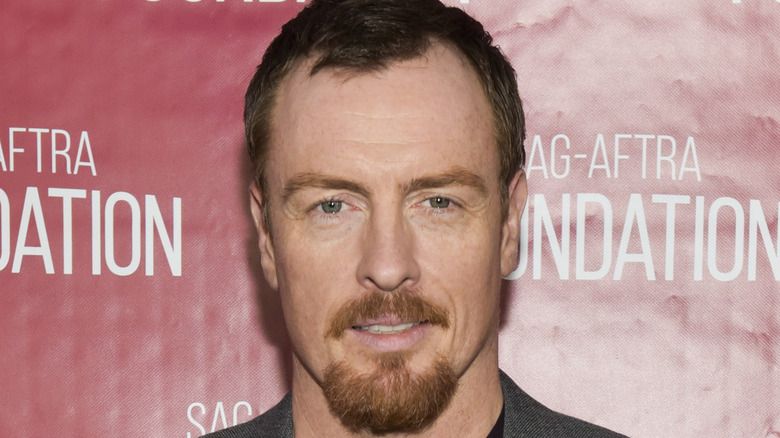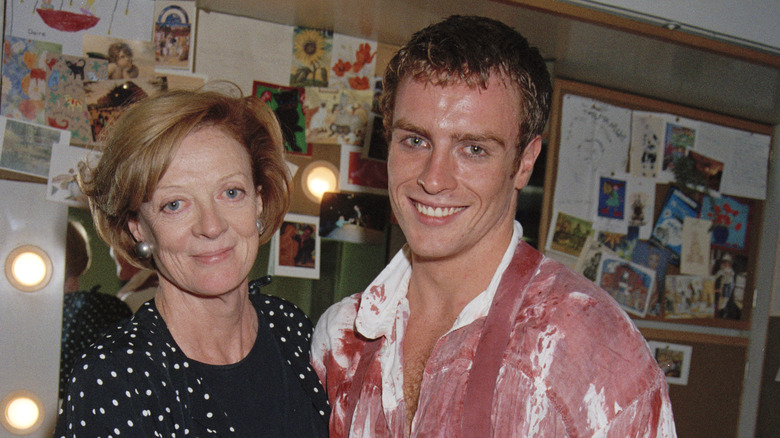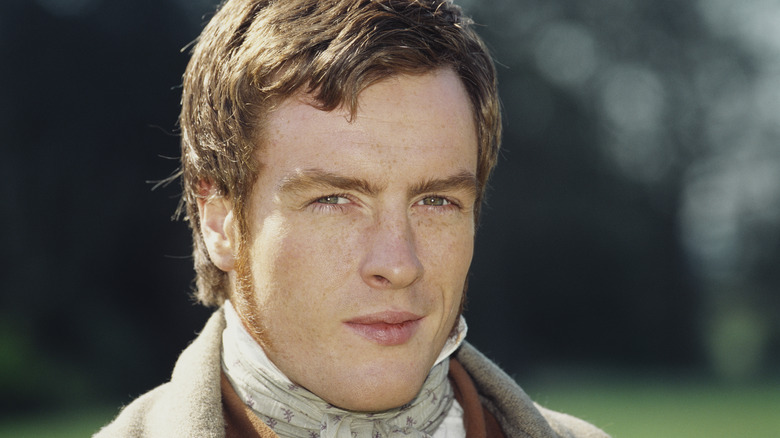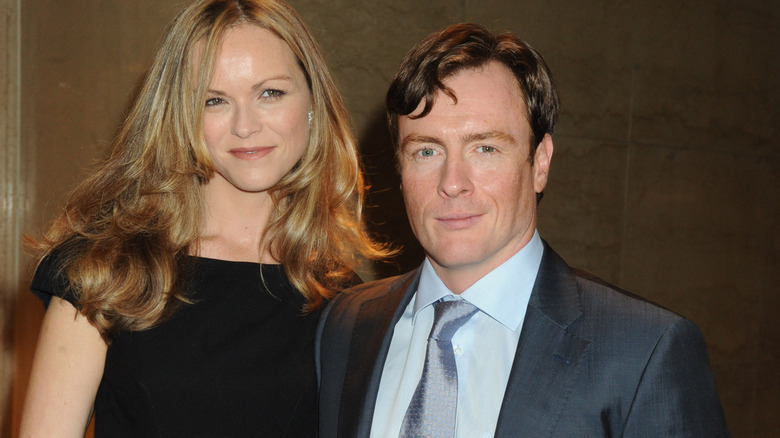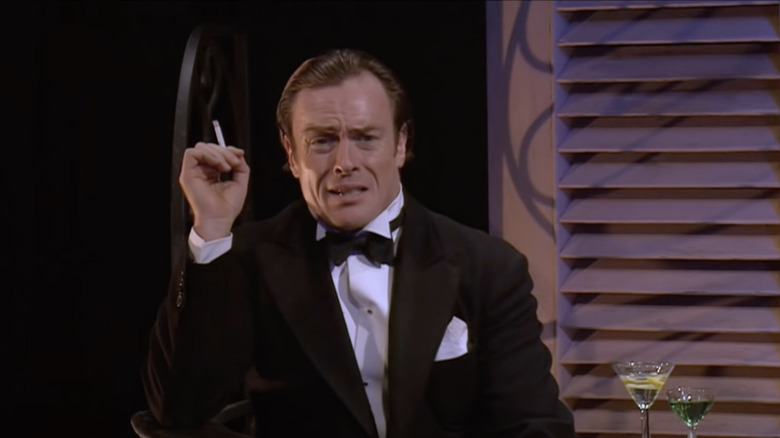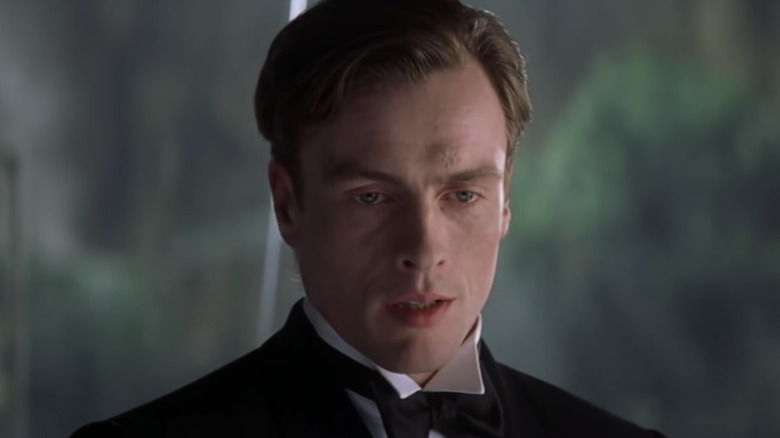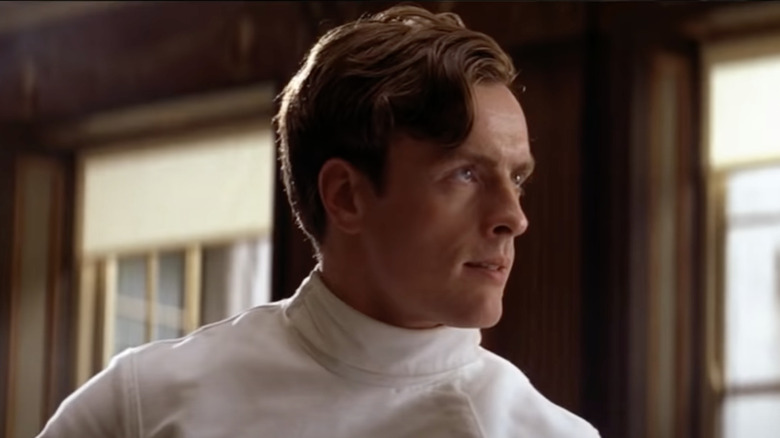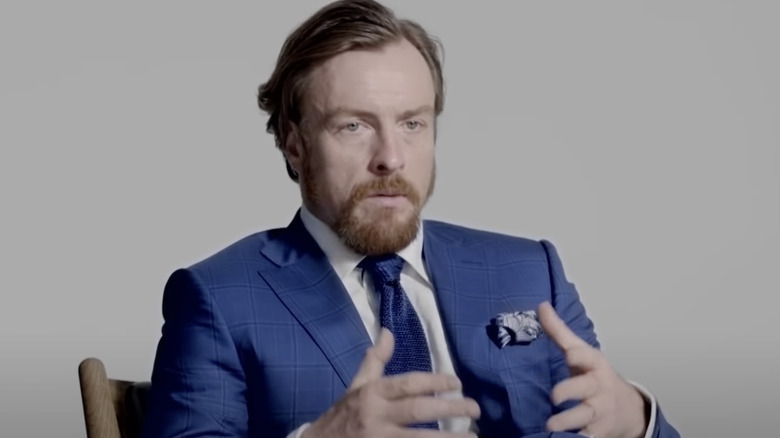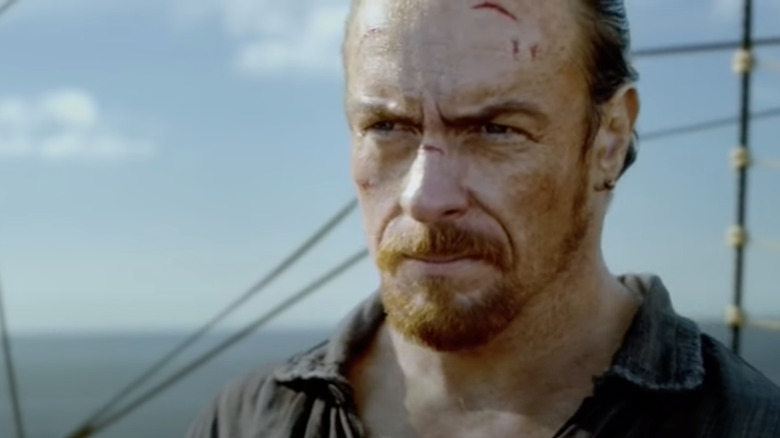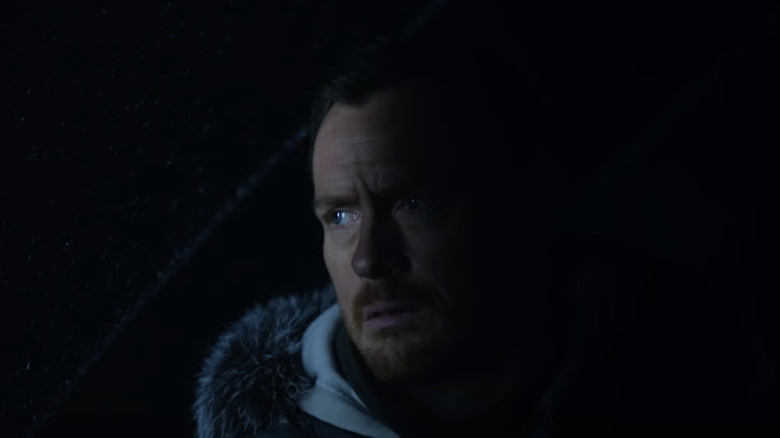The Untold Truth Of Toby Stephens
From his first on-screen appearance in Sally Potter's 1992 Virginia Woolf adaptation "Orlando," British actor Toby Stephens has made a name for himself across film, television, radio, and theatre.
Born in 1969, Stephens attended the London Academy of Musical and Dramatic Arts and began appearing on the London stage to great acclaim soon after graduating. In 1994 he won the Sir John Gielgud Award for best actor for the Royal Shakespeare Company's production of "Coriolanus," in which he played the title role. Though born into a family of acclaimed thespians, Stephens' work stands on its own merits.
After several years starring in film and television in the United Kingdom, Stephens made a jump across the pond in 2000, starring as the title character in the A&E network's adaptation of "The Great Gatsby" (co-starring Paul Rudd and Mira Sorvino) and appearing as the younger version of Clint Eastwood's character in the film "Space Cowboys." In 2002 he landed his most visible role to date, as diamond-obsessed villain Gustav Graves in the James Bond sequel "Die Another Day."
In recent years, Stephens has starred in the Starz network pirate swashbuckler "Black Sails" and Netflix's remake of the 1960s sci-fi classic "Lost in Space," which premiered its third and final season in 2021. Here are some things you may not know about this celebrated actor.
Theatre Royalty
Though he has earned his professional accolades, Stephens did not come out of nowhere. His parents are Sir Robert Stephens and Dame Maggie Smith, legends of the British stage. Sir Robert made his reputation as a brash, muscular actor in the 1950s, playing the great young men of Shakespeare and serving as an inaugural member of Laurence Olivier's National Theatre Company. Dame Maggie is one of the most awarded actors in history on either side of the Atlantic; she won her first Academy Award for "The Prime of Miss Jean Brodie" in 1970, the year after Toby was born, and today is recognizable to audiences around the world as the Dowager Countess on "Downton Abbey" and witchcraft teacher Miss McGonagall in the "Harry Potter" series.
Stephens and Smith divorced in 1975. They would both later re-marry, she to playwright and "Jason and the Argonauts" screenwriter Beverley Cross, and he to actress Patricia Quinn, best known in the US as Magenta in the cult classic "The Rocky Horror Picture Show." Though his parents and step-parents were all of the theatre, it was never a given that Toby would follow in their footsteps, or that it would be an open door if he did. "They tried quite hard to make sure it was what I wanted to do," he told British newspaper the Guardian in 2007.
"Posh" Toby
After his parents split up, Stephens and his older brother Christopher (who acts under the stage name Chris Larkin) settled with their mother in West Sussex, where they attended what Stephens has described as a "second rate" private school. Smith's family was middle class, and Sir Robert's family had working class roots. Despite this, or perhaps because of it, they insisted that Stephens and his brother learn to speak in a more aristocratic accent. "I remember my parents being really on me about speaking in a certain way when I was young," he said in 2015, "I think because they came from a class that aspired to talk like that."
As he grew older and began to pursue acting, Stephens came to resent his normal way of speaking, as it marked him as more "posh," or upper class, than he felt he was. This led to him being typecast in aristocratic roles, often in period dramas — "stuck in anachronistic aspic," as he put it. "You can't be near emotions, you play these curling-lipped haughty characters."
As inconvenient as his "haughty" accent might be, however, he never made much of an effort to speak differently as his career progressed. "It would be like being in denial about what you are."
Acting School Sweethearts
Stephens has been married to his wife, New Zealand actress Anna-Louise Plowman, since 2001, though they had known each other for much longer than that; they were in fact classmates at the London Academy of Musical and Dramatic Arts (Lamda). As he told the Evening Standard (via Tumblr) in 2006, "We met at drama school but I didn't really know her. We met again at a voice-over audition in New York and made a pact that if I got the job I'd take her for dinner and if she got the job she'd take me. I did, so I took her out and we went from there."
Plowman is best known to genre fans for her roles in "Stargate SG-1" and "The Witcher." In 2012 and 2013 she and Stephens mixed the personal and professional by co-starring in a celebrated production of Noel Coward's "Private Lives" — the same play Stephens' parents starred in together in 1972 (under the direction of John Gielgud). Plowman also had a recurring role on "Black Sails." The two have three children, born between 2007 and 2010.
American Icons
For as much as he might worry about sounding too posh, Stephens has quite a facility with dialects and accents, particularly American accents, and has a number of iconic American roles under his belt. In 1996 he starred as Stanley Kowalski opposite Jessica Lange in a London production of "A Streetcar Named Desire," and in 2000 he played the title role in the A&E's "The Great Gatsby" adaptation opposite Paul Rudd as Nick Carraway and Mira Sorvino as Daisy Buchanan.
Having played two of the most potent symbols of American masculinity in fiction, Stephens journeyed out West to play a real life, though no less legendary, character. The 2006 BBC docuseries "The Wild West" examines the legends of the American frontier, from Billy the Kid to the OK Corral, in an effort to separate fact from fiction. Stephens appears in the first episode's dramatic reenactments as General George Custer. In 2011 he used his considerable vocal talents to play the quintessential American private eye, Phillip Marlowe, in a series of Raymond Chandler adaptations for BBC Radio 4.
"For me that it is incredibly freeing," Stephens recently said in reference to his work with American accents. "With an American accent, I can kind of do anything as an actor."
Bond Villain
In 2002 Stephens landed his largest film role to date, as the main villain in "Die Another Day," the James Bond film that would be Pierce Brosnan's final turn as the British superspy. The film is a reference-heavy send-off for Brosnan, with winks and nods to 007 history in nearly every scene, from the belted bikini worn by Halle Berry to the diamond-powered superweapon wielded by Stephens' baddie Gustav Graves. Reviews for the film were not terribly positive, and overall it hasn't aged well. Stephens is unfortunately the (literal) face of the film's most problematic storyline, as a mid-film twist reveals that (spoiler alert) English diamond magnate Gustav Graves is in fact an evil North Korean colonel who faked his death and underwent experimental plastic surgery to appear Caucasian.
Stephens had a difficult time putting the film behind him, in part because he was such an unknown at the time. "It's one thing if you're ["Skyfall" villain] Javier Bardem coming in and doing a Bond movie and you have a whole body of work behind you," he told Syfy Wire. "That's all anyone saw me as. And it took me a long time to get perceived another way."
Bond Redeemed
"Die Another Day" was not the end of Stephens' James Bond affiliation, however. In May 2008, the 100 year anniversary of 007 author Ian Fleming's birth was celebrated with a new radio drama adaptation of "Dr. No" on BBC Radio 4. This time, Stephens was not playing Bond's adversary, but Bond himself. Later that year he was a featured performer at a gala tribute to Fleming, and in 2010 he would return to the role for an adaptation of "Goldfinger." Stephens would play Bond on the radio six more times after that, making him the longest-running James Bond performer in history.
Before Daniel Craig was cast in 2006's "Casino Royale," there were rumors that Stephens was in consideration to pick up the fabled gun and martini, which would have made him the first and only actor to play both hero and villain in the series. Asked about it years later, he laughed off the possibility, joking that his red hair would be an automatic disqualification. "Can you imagine if they'd given it to a ginger?" he joked. "There'd be assassination plots."
Family Addictions
Stephens' father Robert was both a brilliant actor and a heavy drinker; early in his career he seemed determined to follow in both sets of his father's footsteps. "I'd watched Robert die from [alcoholism] but, stupidly, carried on drinking" he told the Guardian, years later and long since sober. In the heaviest drinking days of his twenties, Stephens was not only still functional, but tasting his first real success as an actor and an artist. Eventually, though, the work began to slip; he would forget lines or have trouble seeing straight.
Stephens' nadir would come in New York while auditioning for the 1999 revival of Christopher Fry's "Ring Round the Moon." Upset by the recent death of his stepfather Beverley Cross, Stephens had been out drinking the night before and was too hungover to function properly in the audition. The casting director allowed him to return at a later date, and Stephens would win the role, but at that moment he knew something needed to change.
Looking back, Stephens places much of the blame for both his and his father's drinking on the theatre world's romanticized image of the hell-raising alcoholic actor. "This whole romantic myth of Peter O'Toole and Richard Burton ... How f***ing marvelous would they have been without [alcohol]?"
A Pirate's Life for He
The 2014 Starz pirate drama "Black Sails" took "Treasure Island" as its inspiration, crafting a four-season prequel to the classic Robert Louis Stevenson novel. Starring Stephens as the dread pirate Captain Flint and Luke Arnold as his young quartermaster "Long" John Silver, the massive South African production delivered swashbuckling action with all the violence, gore, and nudity afforded to it by airing on pay cable.
But the show also explored the more political side of the golden age of piracy. When reading the script for the first time, Stephens was struck by how democratic pirate ships could be; most of the men aboard had originally been pressed into naval or merchant service, and to escape to a pirate ship meant reclaiming a freedom that had been taken away. That element certainly proved true for Captain Flint; in Season 2, he is revealed to be a disgraced British naval officer named James McGraw, who was dismissed from service after being discovered in an affair with an aristocrat's son.
The production could be grueling; Stephens found that the waters of South Africa were much colder than the Caribbean sea they were playing on the show. By the end of the fourth and final season, he was looking for a change of pace.
The Space Family Robinson
Stephens found that change of pace on Netflix's family sci-fi adventure "Lost in Space." Compared to the freezing waters, complicated battle scenes, and grim character work, the chance to play stalwart space dad John Robinson was "like holiday camp."
Based on the classic 1960s series, which was itself inspired by the 1812 novel "The Swiss Family Robinson," "Lost in Space" follows the "Space Family Robinson," a family of interstellar explorers on a mission to colonize a new planet. But when their ship is attacked by a mysterious force, the Robinsons are forced to crash land on an uncharted planet. Joining Stephens is "Deadwood" actress Molly Parker as John's wife Maureen and a scene-stealing Parker Posey as a reworked version of the treacherous Dr. Smith (played by Jonathan Harris in the original series).
Stephens was drawn to the ways that the show and his role reject a lot of masculine stereotypes. "He's a former soldier, he's a guy who's lived in a guy's world — but then he's having to adapt to living with his family again." Working with child actors Maxwell Jenkins and Mina Sundwall on a regular basis was also a "refreshing" experience: "It's very easy to become jaded in this industry ... And then you've got these kids bouncing around so excited to be in these space suits, and it makes you go, 'Oh my god, what happened to me? I want to be like that again.'"
